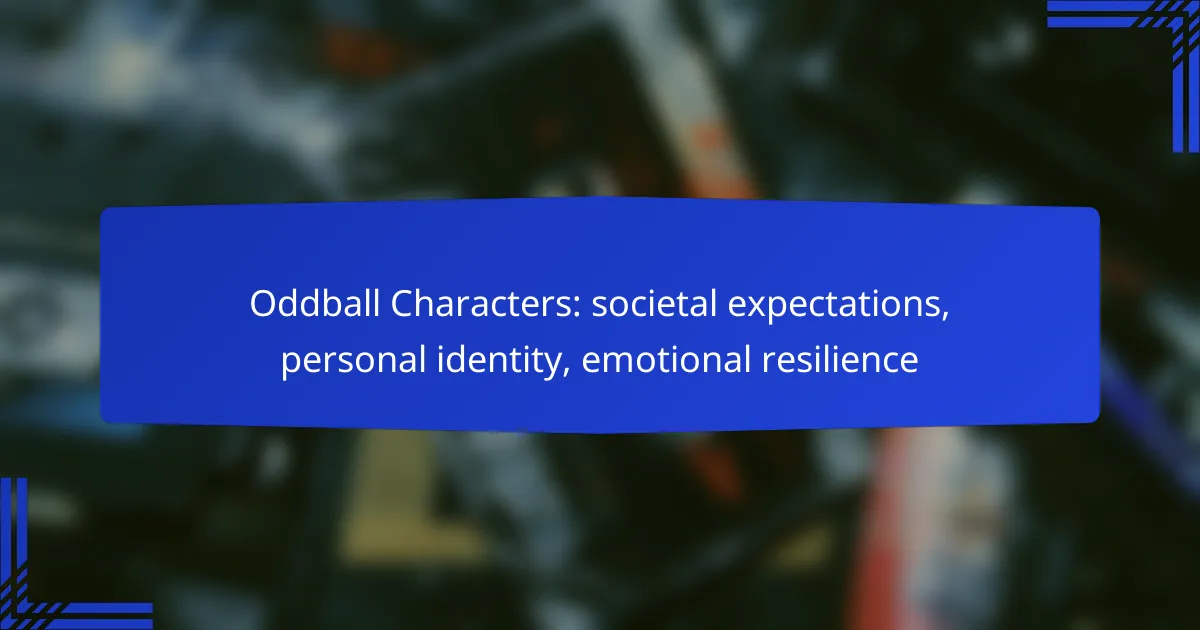Oddball characters challenge societal expectations by celebrating their individuality and personal identity, inspiring others to embrace their uniqueness. Through their journeys, they cultivate emotional resilience, navigating the complexities of self-discovery and community dynamics. By defying conventional norms, these characters not only enrich their own lives but also encourage a broader acceptance of diversity in society.
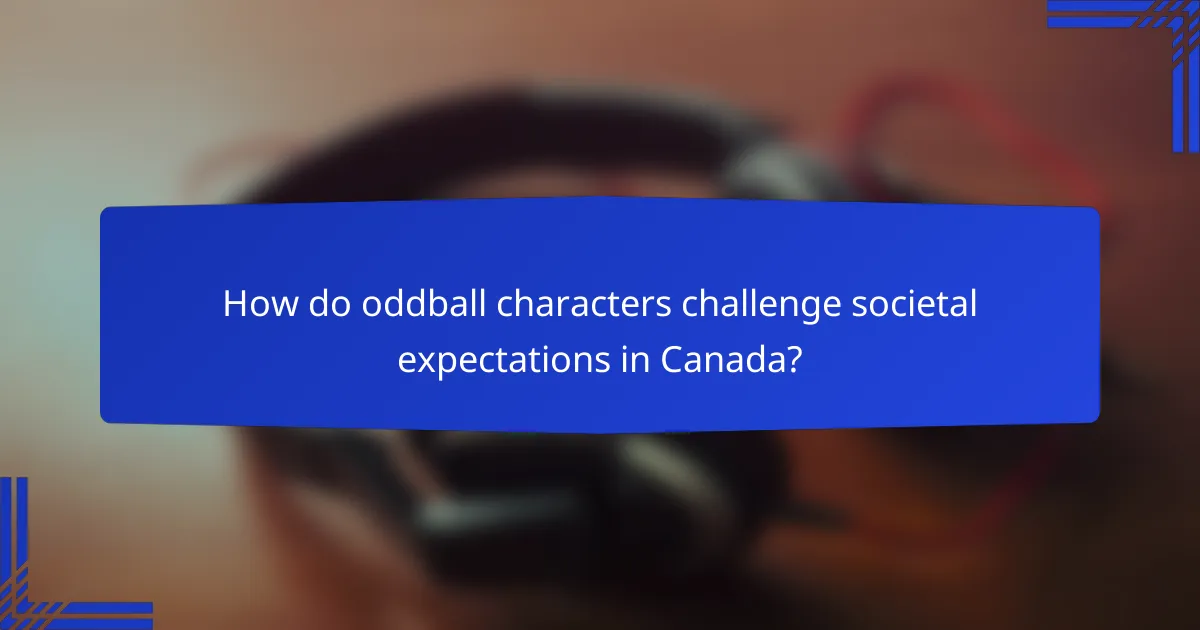
How do oddball characters challenge societal expectations in Canada?
Oddball characters in Canada often defy societal norms, showcasing individuality and personal identity. By embracing their uniqueness, they encourage others to question conventional standards and foster emotional resilience within communities.
Breaking stereotypes
Oddball characters play a crucial role in breaking stereotypes by presenting alternative viewpoints and lifestyles. They challenge the notion of what is considered “normal,” often highlighting the absurdity of rigid societal expectations. This disruption can lead to greater acceptance of diversity in personal identities.
For instance, characters who defy gender norms or exhibit unconventional hobbies can inspire others to embrace their true selves without fear of judgment. This shift not only empowers individuals but also promotes a more inclusive society.
Influencing cultural narratives
Through their unique perspectives, oddball characters significantly influence cultural narratives in Canada. They often serve as catalysts for discussions around identity, mental health, and acceptance, reshaping how society views these topics. By bringing attention to marginalized voices, they encourage broader conversations about belonging and self-acceptance.
Moreover, these characters often reflect the complexities of modern life, resonating with audiences who may feel out of place. Their stories can inspire others to embrace their quirks and foster a sense of community among those who feel different.
Examples from Canadian media
Canadian media features several notable oddball characters that exemplify the challenge to societal expectations. Shows like “Schitt’s Creek” highlight eccentric individuals who redefine success and relationships, showcasing the importance of authenticity over conformity.
Another example is the animated series “Bob’s Burgers,” which includes a diverse cast of characters that celebrate individuality and family dynamics. These portrayals not only entertain but also encourage viewers to reflect on their own identities and the value of embracing differences.
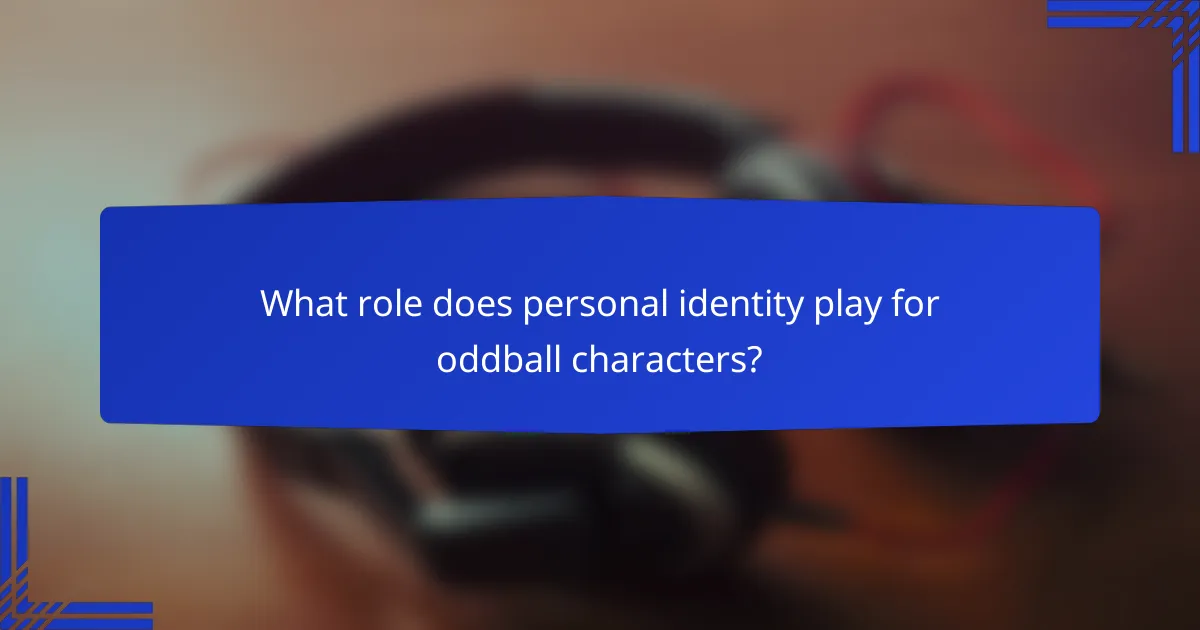
What role does personal identity play for oddball characters?
Personal identity is crucial for oddball characters as it shapes their unique perspectives and interactions with society. Embracing their individuality often leads to self-discovery, emotional resilience, and a deeper understanding of their place in the world.
Self-acceptance journeys
Self-acceptance is a vital part of the journey for oddball characters, often marked by struggles against societal norms. These characters typically undergo a transformative process where they learn to embrace their quirks and differences, leading to a stronger sense of self. This journey can involve confronting internalized stigma and rejecting external pressures to conform.
For many, self-acceptance begins with recognizing the value of their unique traits. This can be facilitated through personal reflection, supportive relationships, or creative expression, allowing them to celebrate their individuality rather than hide it.
Impact of community support
Community support plays a significant role in reinforcing personal identity for oddball characters. A nurturing environment can provide validation and encouragement, helping individuals feel accepted and understood. This support often comes from friends, family, or like-minded groups that share similar experiences and values.
Engaging with a supportive community can enhance emotional resilience, making it easier for oddball characters to navigate challenges. Positive reinforcement from peers can empower them to express their true selves without fear of judgment, fostering a sense of belonging.
Case studies of notable figures
Notable figures like David Bowie and Frida Kahlo exemplify the importance of personal identity for oddball characters. Bowie, through his androgynous alter egos, challenged societal norms and encouraged others to embrace their uniqueness. His journey illustrates how personal identity can inspire creativity and self-expression.
Frida Kahlo’s life and art reflect her struggles with identity, culture, and physical pain. Her bold self-portraits and unapologetic embrace of her heritage highlight the power of personal identity in shaping one’s narrative and connecting with others on a profound level.
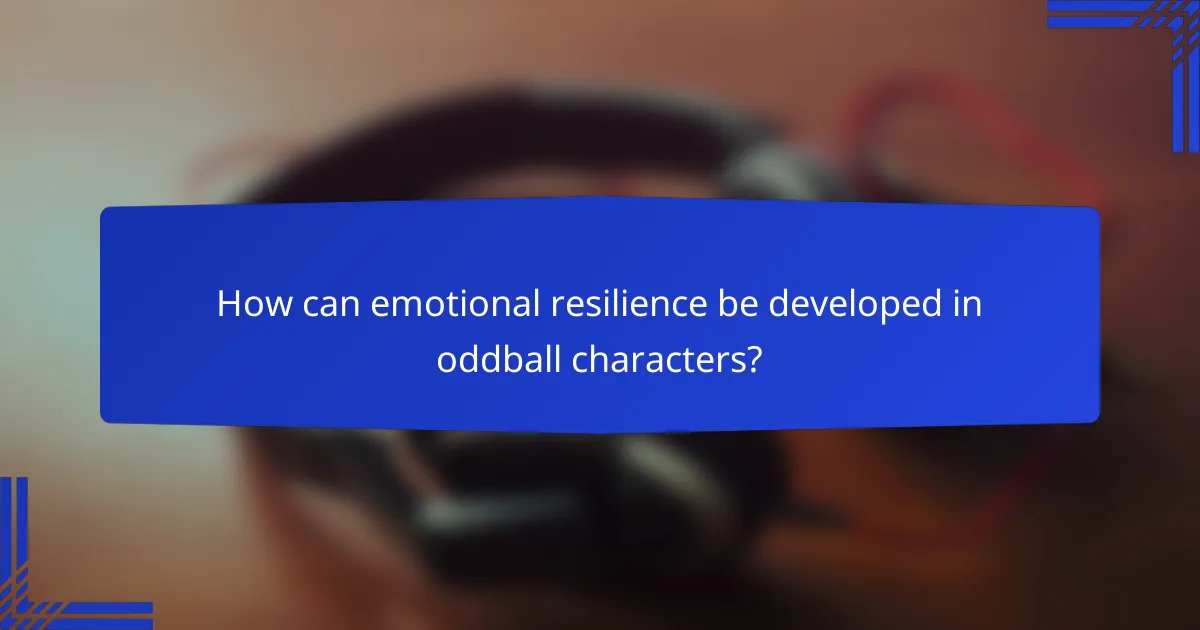
How can emotional resilience be developed in oddball characters?
Emotional resilience in oddball characters can be developed through various strategies that enhance their ability to cope with challenges and societal expectations. This involves fostering a strong sense of self, learning effective coping mechanisms, and building supportive relationships.
Strategies for coping with rejection
Oddball characters often face rejection due to their unique traits or perspectives. Developing coping strategies such as reframing negative experiences can help them maintain a positive outlook. For example, viewing rejection as an opportunity for growth rather than a personal failure encourages resilience.
Another effective strategy is practicing self-compassion. This involves treating oneself with kindness during tough times, which can mitigate feelings of inadequacy. Techniques like journaling about positive experiences can reinforce self-worth and counteract the sting of rejection.
Building supportive networks
Creating a network of supportive individuals is crucial for oddball characters. These networks can include friends, family, or community groups that appreciate their uniqueness. Engaging with like-minded individuals fosters a sense of belonging and reduces feelings of isolation.
Participating in clubs or online forums that celebrate individuality can also help. These spaces provide opportunities for connection and validation, which are essential for emotional resilience. Regularly reaching out for support can strengthen these relationships and create a reliable safety net.
Therapeutic practices
Therapeutic practices such as cognitive-behavioral therapy (CBT) can be beneficial for oddball characters. CBT helps individuals identify and challenge negative thought patterns, promoting healthier emotional responses. This practice can be particularly effective in enhancing resilience by equipping them with tools to manage stress and anxiety.
Mindfulness and meditation are other valuable practices. These techniques encourage present-moment awareness, reducing rumination on past rejections or future anxieties. Regular mindfulness practice can lead to improved emotional regulation and a greater sense of peace.
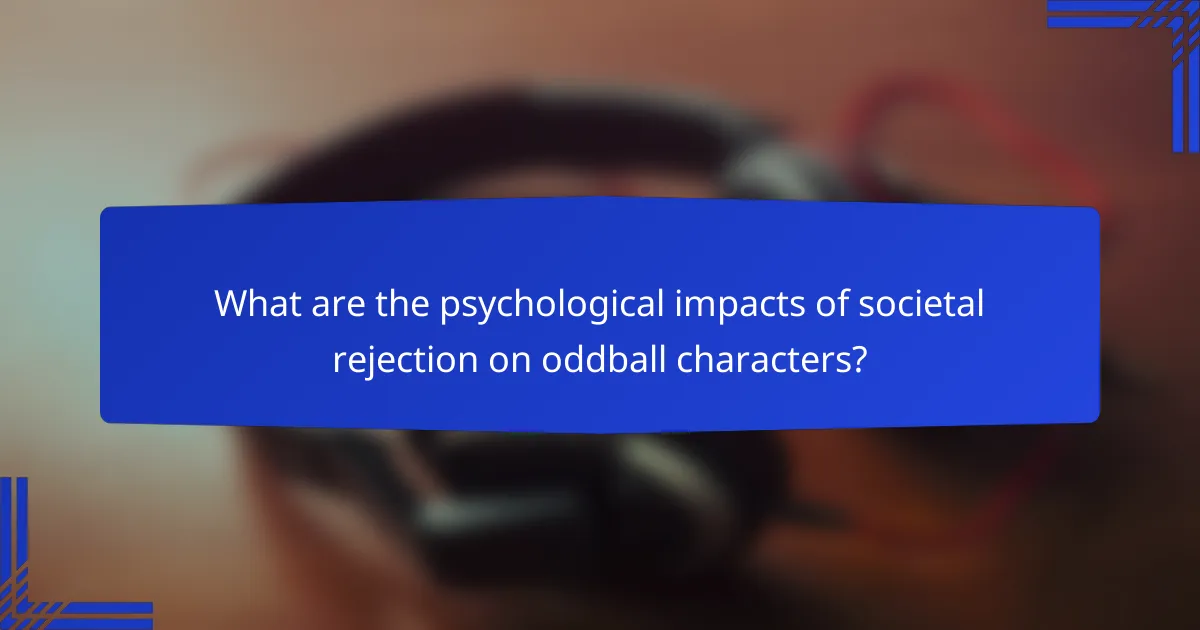
What are the psychological impacts of societal rejection on oddball characters?
Societal rejection can significantly affect oddball characters, leading to feelings of isolation, low self-esteem, and anxiety. These psychological impacts often stem from the disconnect between their unique identities and societal expectations.
Effects on mental health
The mental health of oddball characters can suffer due to societal rejection, manifesting in conditions such as depression and anxiety disorders. They may experience heightened stress levels and feelings of worthlessness, which can lead to social withdrawal and avoidance behaviors.
For instance, an oddball character who faces constant criticism may develop a negative self-image, causing them to isolate themselves further. This cycle can perpetuate mental health issues, making it crucial for them to seek support and connection with like-minded individuals.
Long-term emotional consequences
Long-term emotional consequences of societal rejection can include chronic feelings of loneliness and a diminished sense of belonging. Oddball characters may struggle with trust issues, making it difficult to form meaningful relationships.
Over time, these emotional scars can lead to a reluctance to express their true selves, resulting in a conformist approach to life that stifles their individuality. It’s vital for them to engage in self-acceptance practices and find communities that celebrate diversity to counteract these effects.
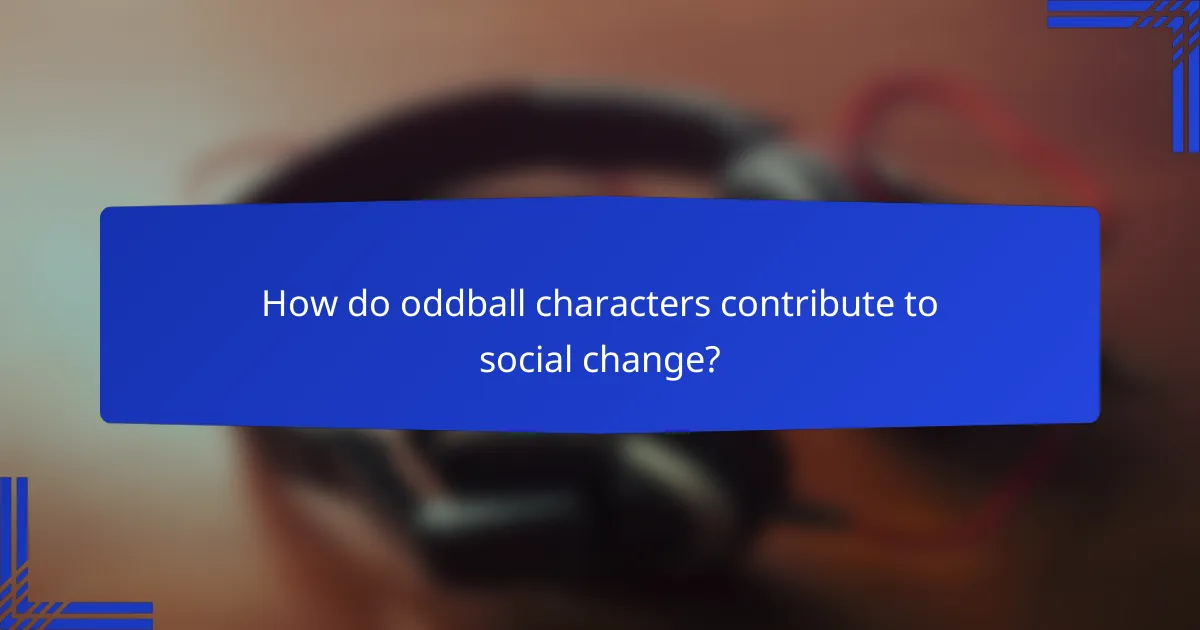
How do oddball characters contribute to social change?
Oddball characters play a crucial role in social change by challenging societal expectations and promoting personal identity. Through their unique traits and perspectives, they encourage audiences to question norms and embrace diversity.
Advocacy through representation
Representation of oddball characters in media fosters inclusivity and validates the experiences of marginalized groups. When these characters are portrayed authentically, they empower viewers to embrace their own identities and advocate for acceptance.
For example, films and television shows featuring neurodiverse characters can help demystify conditions like autism, leading to greater understanding and support in society. This representation can inspire real-world advocacy efforts aimed at improving resources and rights for these communities.
Challenging norms in popular culture
Oddball characters often serve as catalysts for challenging societal norms in popular culture. By embodying traits that defy conventional expectations, they encourage audiences to rethink stereotypes and embrace individuality.
Consider characters like Luna Lovegood from the “Harry Potter” series or Sheldon Cooper from “The Big Bang Theory.” Their quirks and unconventional behaviors not only entertain but also prompt discussions about acceptance and the value of diversity in everyday life.

What frameworks exist for understanding oddball characters?
Frameworks for understanding oddball characters often focus on the interplay between societal expectations, personal identity, and emotional resilience. These frameworks help analyze how unique individuals navigate their differences in various contexts, including social, cultural, and psychological dimensions.
Societal Expectations
Societal expectations shape how oddball characters are perceived and treated. These norms dictate acceptable behavior, appearance, and interests, often marginalizing those who do not conform. For instance, in many cultures, traditional career paths are valued, making unconventional choices seem less legitimate.
Understanding societal expectations involves recognizing the pressures to fit in and the consequences of non-conformity. Oddball characters may face criticism or exclusion, but they can also challenge these norms and inspire change. A practical approach is to analyze specific societal standards that apply to the character’s context, such as family expectations or community values.
Personal Identity
Personal identity is crucial for oddball characters as it defines their sense of self amidst external pressures. This identity can be influenced by various factors, including culture, upbringing, and personal experiences. For example, an artist in a conservative community may struggle to express their creativity due to fear of judgment.
To explore personal identity, consider how characters reconcile their uniqueness with societal norms. Techniques like journaling or self-reflection can help individuals articulate their identities. Encouraging acceptance of diverse identities fosters resilience and promotes understanding in broader society.
Emotional Resilience
Emotional resilience is the ability to adapt and thrive despite challenges, which is often essential for oddball characters. These individuals may encounter rejection or misunderstanding, making emotional strength vital for their well-being. Developing resilience involves coping strategies, such as seeking support from like-minded individuals or engaging in creative outlets.
To build emotional resilience, oddball characters can practice mindfulness, cultivate a positive self-image, and establish a supportive network. Recognizing their unique strengths and contributions can empower them to navigate adversity effectively. Resources like workshops or community groups can provide additional support and tools for enhancing resilience.
